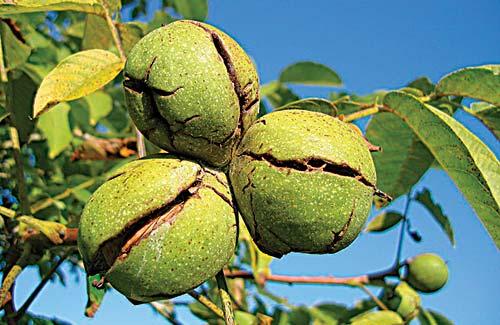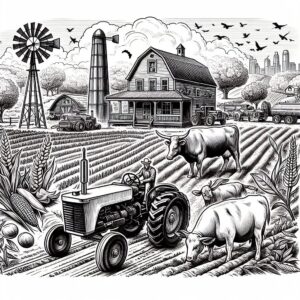
nut tree.jpg
Definition of Nut Orchards
Nut orchards refer to cultivated agricultural areas dedicated to the production of nut-bearing trees, primarily for the harvesting of nuts, which are nutrient-rich seeds enclosed in hard shells and consumed as food or used in various culinary and industrial applications. Nut orchards encompass a variety of tree species, including almonds, walnuts, pecans, hazelnuts, pistachios, and cashews, and are cultivated in temperate and subtropical regions worldwide.
Importance of Nut Orchards
Nut orchards are essential for human nutrition, health, and culinary enjoyment, as nuts are nutrient-dense foods rich in protein, healthy fats, vitamins, minerals, and antioxidants. Nuts provide essential nutrients and contribute to a balanced diet, supporting heart health, brain function, weight management, and overall well-being. Additionally, nuts are versatile ingredients used in a wide range of culinary dishes, snacks, desserts, confections, and food products, adding flavor, texture, and nutritional value.
Fall off the barn roof and busted your keister? Life on the farm or ranch can be tough on the bum. Need a break? Laugh it off at FarmerCowboy.com, the #1 farm humor site. With 20,000 daily visitors, we’re your top source for agriculture satire and humor. Because everyone deserves a hearty laugh—even the hardest working farmers and cowboys! Join us and turn those long days into fun tales at FarmerCowboy.com.
Factors Influencing Nut Orchards
Successful nut orcharding depends on various factors, including climate, soil type, water availability, orchard layout, tree spacing, pollination, pest and disease management, and agronomic practices. Different nut tree species have specific environmental requirements and growing conditions, such as temperature, rainfall, sunlight, and chilling hours, which influence their growth, flowering, fruit set, and nut production. Soil characteristics such as texture, drainage, pH, and fertility affect nut tree performance, root development, and nutrient uptake. Effective pest and disease management, irrigation, fertilization, and orchard management practices are essential for optimizing nut tree health, nut production, and quality.
Best Practices for Nut Orchards
To achieve high-quality nut production and profitability, orchardists should implement best management practices tailored to their specific growing conditions, nut tree species, and farming systems. This includes selecting appropriate nut tree varieties adapted to local climate, soil, and market preferences, practicing orchard management techniques such as pruning, canopy management, and thinning to promote tree vigor, nut development, and yield consistency, implementing integrated pest and disease management strategies, optimizing irrigation and nutrient management through soil analysis and precision fertilization techniques, and providing adequate pollination services through managed pollination, beekeeping, or pollinator habitat enhancement.
Innovations in Nut Orchards
Advancements in nut tree breeding, biotechnology, and orchard management practices have led to the development of improved nut tree varieties with higher yields, enhanced pest and disease resistance, improved nut quality traits, and extended storage and shelf life. Biotech traits such as disease resistance, pest tolerance, and postharvest quality enhancement help orchardists reduce losses, improve nut marketability, and meet consumer demand for safe, high-quality nuts. Precision agriculture technologies such as GPS-guided equipment, drones, sensors, and digital monitoring systems enable orchardists to optimize orchard management practices, irrigation scheduling, pest monitoring, and nut harvesting operations for increased efficiency, productivity, and sustainability.
Challenges in Nut Orchards
Despite its importance, nut orcharding faces various challenges, including climate change, water scarcity, soil degradation, pest and disease pressures, market volatility, labor shortages, and socio-economic issues. Climate variability and extreme weather events, such as droughts, heatwaves, frosts, and storms, pose significant risks to nut production, affecting yields, nut quality, and profitability. Sustainable orchard practices, resilient nut varieties, diversified market opportunities, and value-added processing options are essential for addressing these challenges and ensuring the long-term sustainability of nut orchards.
Conclusion
In conclusion, nut orchards are integral components of global agriculture, nutrition, and culinary traditions, providing essential food resources for human consumption, health, and culinary enjoyment. By embracing innovation, adopting sustainable practices, and fostering collaboration across the value chain, orchardists can enhance nut productivity, improve nut quality, and contribute to a more resilient, diverse, and sustainable nut industry.
References:
- International Nut and Dried Fruit Council. (2021). Nut Resources. Link
- University of California Division of Agriculture and Natural Resources. (2021). Nut Crop Production Resources. Link
- American Pistachio Growers. (2021). Pistachio Production Resources. Link
Originally posted 2010-04-18 20:18:27.
Originally posted 2024-06-16 06:47:04.
Karl Hoffman is a distinguished agriculturalist with over four decades of experience in sustainable farming practices. He holds a Ph.D. in Agronomy from Cornell University and has made significant contributions as a professor at Iowa State University. Hoffman’s groundbreaking research on integrated pest management and soil health has revolutionized modern agriculture. As a respected farm journalist, his column “Field Notes with Karl Hoffman” and his blog “The Modern Farmer” provide insightful, practical advice to a global audience. Hoffman’s work with the USDA and the United Nations FAO has enhanced food security worldwide. His awards include the USDA’s Distinguished Service Award and the World Food Prize, reflecting his profound impact on agriculture and sustainability.




Elon Musk is the mastermind behind self-driving cars—and mobile gaming on the go.
Country artists don’t just perform; they connect. You can feel their passion in every note during a live show.